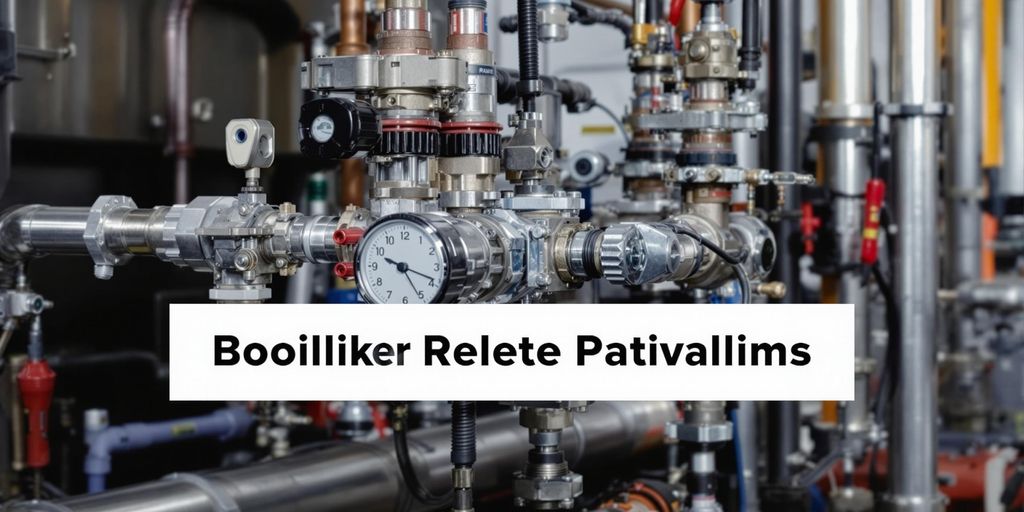Keeping boilers in top shape is not just a good idea; it’s a necessity. Boilers are the heart of many industrial operations, and when they falter, everything else can grind to a halt. This article dives into the nuts and bolts of Boiler PM, R&M, and services, shedding light on why these practices are vital for smooth operations. Whether it’s regular check-ups or adopting the latest tech, there’s a lot to consider for maintaining peak performance. Let’s explore the key takeaways that will help ensure your boiler runs efficiently and safely.
Key Takeaways
- Regular maintenance of boilers is crucial to prevent unexpected breakdowns and ensure efficiency.
- Understanding the components and common issues of boiler systems can help in timely troubleshooting.
- Implementing predictive maintenance can save costs and extend the lifespan of boiler equipment.
- Training for operators is essential to maintain safety and operational efficiency.
- Adopting new technologies like automation and data analytics can optimize boiler performance.
Understanding Boiler PM / R&M / Services
Importance of Regular Maintenance
Regular maintenance of boilers is like taking your car in for a tune-up. You wouldn’t skip an oil change, right? Well, boilers need the same kind of love. Consistent upkeep helps prevent unexpected breakdowns, which can be a real headache, especially when you need hot water or heating the most. Regular checks ensure the system runs smoothly, extending its lifespan and saving you money in the long run.
Key Components of Boiler Systems
Boilers are more than just big metal boxes. They’re complex systems with several key parts:
- Burner: Where the fuel mixes with air for combustion.
- Heat Exchanger: Transfers heat from the burner to the water.
- Controls: Manage the operation of the boiler, including temperature and pressure settings.
Understanding these components can help you troubleshoot when things go wrong and communicate better with your service provider.
Common Issues in Boiler Operations
Even with regular maintenance, boilers can face some common issues:
- Leaking Water: Often due to a faulty valve or pipe connection.
- Pilot Light Problems: Can be caused by a draft or a broken thermocouple.
- Kettling: This is when limescale builds up, causing a rumbling noise.
Keeping an eye on these issues early can save you from bigger problems down the line. It’s like catching a cold before it turns into the flu.
For those trying to decide between different heating systems, understanding the differences between boilers and furnaces can be crucial. Boilers are generally more energy-efficient and provide consistent heat, making them a popular choice for many homeowners.
Best Practices for Boiler Maintenance
Scheduled Maintenance Routines
Regular maintenance routines are the backbone of any reliable boiler system. Consistent checks and servicing can prevent unexpected breakdowns and extend the lifespan of the equipment. It’s like taking your car for regular oil changes—keeps everything running smoothly. A typical schedule might include:
- Monthly inspection of safety valves and controls.
- Quarterly checks on burner and flame sensors.
- Annual cleaning of the entire system, including flue passages.
Utilizing Predictive Maintenance
Predictive maintenance is a game-changer in the boiler industry. Instead of waiting for something to break, this approach uses data to predict when a part might fail. Think of it as having a crystal ball for your boiler. By analyzing patterns and trends, you can address issues before they become serious problems, saving both time and money.
Training for Boiler Operators
Operators are the unsung heroes of boiler maintenance. Proper training ensures they can spot early signs of trouble and perform basic maintenance tasks. It’s crucial to have them familiar with the system’s operations and safety protocols. This hands-on knowledge can significantly reduce downtime and maintenance costs.
Investing in operator training is not just about compliance; it’s about ensuring your team is equipped to handle the unexpected challenges that come with managing complex boiler systems.
For more information on effective boiler field services, consider the importance of meticulous measurements and proactive approaches to maintenance.
Innovative Technologies in Boiler Services
Condition Monitoring Systems
Condition monitoring systems are like the silent guardians of boiler operations. They keep an eye on the equipment, catching any issues before they become big problems. These systems use sensors and software to monitor temperature, pressure, and other vital stats. This early detection helps prevent costly breakdowns and keeps the boilers running smoothly. Imagine having a system that alerts you before a pipe bursts or a valve fails. That’s the power of condition monitoring.
Automation in Boiler Management
Automation is changing the game for boiler management. With advanced controls and smart systems, boilers can now adjust their operations based on real-time data. This means less manual intervention and more efficient performance. Automated systems can tweak the fuel-air mix, control the heat output, and even schedule maintenance tasks. It’s like having a high-tech assistant that ensures everything runs at peak efficiency.
Data Analytics for Performance Optimization
Data analytics is all about turning numbers into insights. In the world of boilers, this means analyzing operational data to find ways to improve efficiency and reduce waste. By crunching the numbers, operators can identify patterns and trends that might not be obvious at first glance. This leads to smarter decisions and better performance. Plus, with predictive analytics, you can foresee potential issues and address them before they impact operations.
Embracing these technologies not only boosts efficiency but also extends the lifespan of boiler systems. In a world where every bit of energy counts, modern boiler maintenance with these innovations is a smart move.
Safety Protocols in Boiler Operations
Compliance with Safety Standards
Adhering to safety standards is a must in boiler operations. These standards ensure that boilers operate within safe limits and help prevent accidents. Organizations must regularly update their safety procedures to align with the latest regulations. Regular safety checks, including testing safety valves before each shift, are crucial for ensuring safe and efficient boiler operation. Following these protocols not only safeguards the equipment but also protects the personnel involved.
Emergency Response Procedures
Having a clear and well-practiced emergency response plan is essential. This plan should include steps for shutting down the boiler safely, evacuating the area, and contacting emergency services. Regular drills help ensure that everyone knows their role in an emergency.
- Identify potential hazards and assess risks.
- Develop a comprehensive response plan.
- Conduct regular training and drills for all staff.
Regular Safety Audits
Conducting regular safety audits helps identify potential risks and areas for improvement. These audits should be thorough and include checking the physical condition of the boiler, reviewing maintenance records, and ensuring compliance with safety standards. Audits provide valuable insights into the effectiveness of current safety measures and highlight areas that need attention.
Safety is not just a priority, it’s a continuous commitment. Regular audits and updates to safety protocols are essential to maintaining a safe working environment.
Cost-Effective Strategies for Boiler R&M

Budgeting for Maintenance Services
Creating a realistic budget for boiler maintenance is like setting the foundation for a house. You want it solid, so everything else stays upright. Regular check-ups and timely repairs can save a ton of cash in the long run. Start by assessing your boiler’s age, condition, and usage patterns. Then, allocate funds for both routine maintenance and unexpected repairs. It’s wise to have a buffer for those surprise issues that pop up.
Evaluating Service Providers
Choosing the right service provider is crucial. Not all providers are created equal, and selecting the wrong one can lead to more headaches than solutions. Consider these steps:
- Research potential providers – Look for those with good reviews and a solid track record.
- Compare costs – Don’t just go for the cheapest option; consider the value and quality of service.
- Check for certifications – Ensure they have the necessary credentials and expertise to handle your specific boiler type.
Long-Term Cost Savings Through Efficiency
Investing in efficiency might seem costly upfront, but it pays off over time. Upgrading to energy-efficient models or retrofitting existing systems can reduce fuel consumption and lower utility bills. Implementing tips for enhancing efficiency can further drive down costs. Regularly monitoring performance and making adjustments as needed keeps the system running smoothly and economically.
In the end, a proactive approach to boiler maintenance not only cuts costs but also extends the lifespan of your equipment, ensuring reliable operation for years to come.
Environmental Considerations in Boiler Services
Boilers, especially industrial steam boilers, play a big role in global CO2 emissions. They account for about 15-20% of these emissions. With growing concerns about climate change, it’s important to find ways to reduce their environmental impact. Switching to cleaner fuels like natural gas or biomass can significantly cut down emissions. Another effective method is incorporating emission control technologies such as scrubbers and catalytic converters.
Energy Efficiency Improvements
Improving energy efficiency in boiler operations not only helps the environment but also saves money. Here are a few strategies:
- Regular Maintenance: Keeping boilers well-maintained ensures they operate at peak efficiency.
- Insulation: Proper insulation minimizes heat loss, which can save energy.
- Heat Recovery Systems: Implementing systems to recover heat from exhaust gases can boost efficiency.
Sustainable Practices in Maintenance
Sustainability isn’t just about reducing emissions; it’s also about how you maintain your equipment. Sustainable maintenance practices include:
- Predictive Maintenance: Using data analytics to predict when maintenance is needed, reducing unnecessary work.
- Recycling and Reusing Materials: Whenever possible, recycle parts and materials to minimize waste.
- Training: Ensuring staff are trained in sustainable practices can make a big difference.
Embracing sustainable methods in boiler operations is not just a trend but a necessity in today’s world. It’s about ensuring that we leave a cleaner planet for future generations.
Future Trends in Boiler PM / R&M / Services

Industry 4.0 is reshaping how boilers are maintained and operated. Smart technologies like IoT and AI are making it possible to monitor boilers in real-time, predicting issues before they become problems. This means less downtime and fewer unexpected repairs. Companies are integrating sensors and using advanced data analytics to track performance, which helps in planning maintenance more effectively. These innovations are not just tech fads; they are becoming essential tools for modern boiler management.
New tech is always on the horizon and for boilers, it’s no different. Technologies such as augmented reality (AR) and virtual reality (VR) are starting to play a role in training and maintenance. Imagine a technician using AR glasses to see detailed schematics of a boiler system while performing repairs. This not only speeds up the process but also reduces errors. Additionally, advancements in condition-monitoring sensors are crucial for minimizing downtime and improving the lifespan of boiler systems.
Regulations are always changing, and staying compliant is a big part of boiler maintenance. As environmental concerns grow, stricter emission standards are being enforced. This means that boiler systems must be updated to meet these new standards, which can be costly but necessary. Companies must keep an eye on these regulatory shifts to ensure they are not only compliant but also ahead of the curve, avoiding fines and ensuring smooth operations.
The future of boiler maintenance is not just about keeping things running; it’s about integrating new technologies and adapting to changing regulations. As the industry evolves, those who embrace these changes will lead the way in efficiency and reliability.
Conclusion
Keeping your boiler in top shape isn’t just about avoiding breakdowns—it’s about making sure everything runs smoothly and efficiently. Regular maintenance and timely repairs can save you a lot of headaches and money in the long run. It’s like taking your car for a tune-up; you wouldn’t skip that, right? So, don’t skip on your boiler either. By staying on top of things, you ensure that your system works when you need it most, especially in those chilly months. Remember, a little attention now can prevent big problems later. So, keep an eye on your boiler, and it’ll keep you warm and cozy.
Frequently Asked Questions
Why is regular maintenance important for boilers?
Regular maintenance helps keep boilers running smoothly, prevents unexpected breakdowns, and extends their lifespan.
What are the key parts of a boiler system?
A boiler system includes the burner, combustion chamber, heat exchanger, and controls.
What common problems can occur with boilers?
Boilers can face issues like leaks, pressure problems, and thermostat failures.
How often should boiler maintenance be scheduled?
Boiler maintenance should be scheduled at least once a year to ensure optimal performance.
What role does predictive maintenance play in boiler care?
Predictive maintenance uses data to predict when a boiler might fail, allowing for timely repairs.
What are the benefits of training boiler operators?
Training helps operators run boilers efficiently and safely, reducing the risk of accidents and improving system performance.




